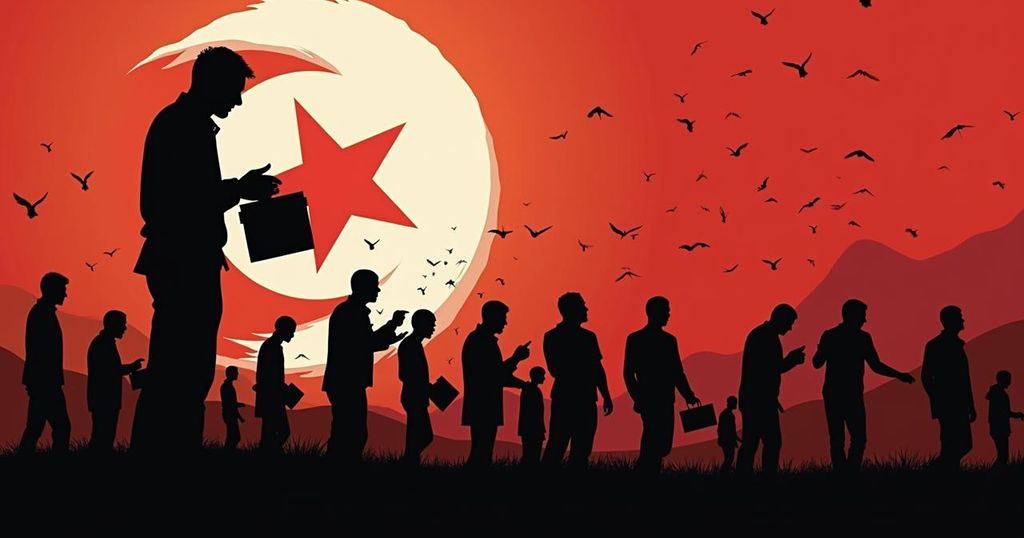Saied’s Controversial Victory in Tunisia Highlights Concerns Over Repression and Democracy

In Tunisia’s recent presidential election, incumbent President Kais Saied claimed a controversial victory with 90.7% of the vote amidst a low turnout of 28.8%, raising alarm over repression and electoral malpractice. Critics have highlighted Saied’s authoritarian tactics, the elimination of political competition, and growing civil unrest, leading to concerns for the future of democracy in the nation.
Incumbent President Kais Saied has been declared the winner of Tunisia’s presidential election with an overwhelming 90.7% of the votes, despite a controversial low voter turnout of just 28.8%. This result has intensified concerns regarding the political climate in Tunisia, highlighting deep divisions within the country. Throughout the election process, allegations of electoral malpractice and repression swirled, particularly as one of the three approved candidates faced imprisonment and multiple potential challengers were barred from running. Saied’s victory is marked by a backdrop of civil unrest against his administration, which has faced criticism for stifling civil society, suppressing dissent, and prosecuting political rivals. After the announcement of his electoral success, Saied proclaimed, “This is a continuation of the revolution. We will build and will cleanse the country of the corrupt, traitors, and conspirators.” The pre-election period saw a concerted effort by authorities to eliminate competition, as the Independent High Authority for Elections (ISIE) approved only three candidates from a pool of seventeen, with many of those rejected having legal and political backing to contest. Critics, including Human Rights Watch’s Bassam Khawaja, condemned the electoral oversight as biased towards Saied, adding, “It’s clear that democracy in Tunisia is in a complete backslide.” Analysts suggest that the fractured opposition contributed to the low turnout, with public opinion polarized between supporting Saied’s caustic anti-corruption rhetoric and boycotting a process perceived as illegitimate. Despite Saied’s claims of a hard-fought campaign, critics argue he primarily utilized conspiracy theories to bolster his image, leading many to fear an escalation of oppression in his second term. Internationally, reactions from European leaders have been scant, with many prioritizing immigration control over democratic governance in Tunisia, fearful of the implications of instability on migration routes to the EU. Saied’s administration, while racked with criticisms, has managed to capture the EU’s support through its efforts to curb migration.
The political landscape in Tunisia has drastically shifted since the 2011 revolution, which saw the overthrow of the former regime. Tunisia was lauded as a beacon of democracy in the Arab world; however, the trajectory has shifted dramatically under President Kais Saied since his power consolidation in July 2021. His presidency has been marred by controversial power grabs, suppression of dissent, and limitations imposed on civil liberties, including the media and political opposition. The recent presidential election, held amidst these tensions, was characterized by significant public distrust towards the electoral process, claims of rigged voting, and widespread civil unrest. Saied’s rhetoric frequently targets perceived enemies within the system, including various societal groups and political rivals, making the current political climate tense and polarized.
The electoral triumph of Kais Saied, marked by an alarming low turnout and hefty allegations of suppression and manipulation, raises profound concerns over the future of democracy in Tunisia. Observers express anxiety regarding Saied’s increasing authoritarian tendencies and the socio-political ramifications of his renewed mandate. While international actors appear to prioritize migration control over a genuine concern for democratic governance in Tunisia, many fear that the domestic atmosphere will intensify under Saied’s continuing regime, resulting in further repression of dissent and civil liberties.
Original Source: www.aljazeera.com








